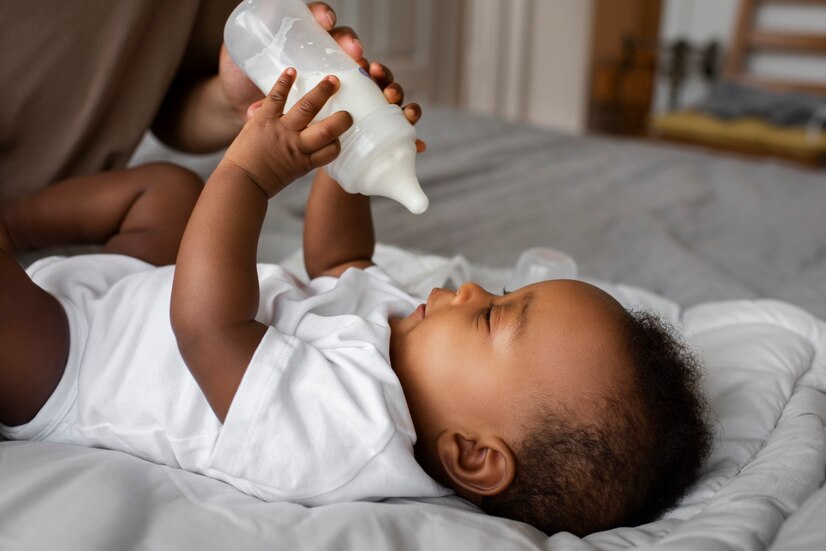Having a baby for the first time can be challenging: there is so much you need to know to raise a healthy little human. Let us share some important info!
Sterilization is a process used to eliminate or kill all forms of microorganisms, including bacteria, viruses, fungi, and spores, on surfaces, objects, or liquids. It ensures that an item is completely free of any living organisms that could potentially cause infection or contamination.
Sterilizing baby items can be important, especially in the first few months, when your baby’s immune system is still developing. However, not all baby items need to be sterilized every time.
When to sterilize
All feeding equipment (bottles, nipples, pacifiers, etc.) should be sterilized before the first use to ensure they are clean and safe.
It’s good practice to regularly sterilize items for newborns, as their immune systems are still fragile.
Sterilization is even more important for premature babies or those with specific health issues to reduce the risk of infections.
Sterilize if items have fallen on the ground, been exposed to unclean surfaces, or if someone sick has come in contact with them.
What to sterilize
❥ Bottles and nipples: these should be sterilized regularly, particularly after the first use, and then cleaned thoroughly with hot, soapy water or in a dishwasher.
❥ Pacifiers: should be sterilized if they fall on the floor or are exposed to contaminants.
❥ Breast pumps: parts that come in contact with breast milk should be sterilized to prevent bacterial growth.
Methods of sterilization
❤ Boiling: put items in boiling water for 5-10 minutes.
❤ Steam sterilizers: electric steam sterilizers or microwaveable sterilizer bags are convenient options.
❤Chemical sterilization: sterilizing tablets or liquids designed for baby products.
❤ Less crucial items:
Clothing, toys, and blankets: these typically don’t need sterilization but should be washed regularly with baby-safe detergents.
While frequent sterilization is important early on, by the time a baby is 3-4 months old, washing items thoroughly with soap and water or using a dishwasher becomes sufficient for most everyday cleaning.
Remembering all of the above, you should consider that exposure to everyday germs and bacteria allows a baby’s immune system to gradually learn how to recognize and fight off infections. While sterilization is important in the first few months, especially for items like bottles and pacifiers, over-sterilizing beyond this period can limit the baby’s natural ability to build immunity. Allowing them to encounter a normal range of microbes in their environment helps their body develop defenses, reducing the likelihood of allergies, asthma, and autoimmune conditions later in life. Controlled exposure to germs can thus support healthier immune system development over time.
Sterilization is a process used to eliminate or kill all forms of microorganisms, including bacteria, viruses, fungi, and spores, on surfaces, objects, or liquids. It ensures that an item is completely free of any living organisms that could potentially cause infection or contamination.
Sterilizing baby items can be important, especially in the first few months, when your baby’s immune system is still developing. However, not all baby items need to be sterilized every time.
When to sterilize
- Before the first use.
All feeding equipment (bottles, nipples, pacifiers, etc.) should be sterilized before the first use to ensure they are clean and safe.
- For babies under 3 months.
It’s good practice to regularly sterilize items for newborns, as their immune systems are still fragile.
- If baby is premature or has health issues.
Sterilization is even more important for premature babies or those with specific health issues to reduce the risk of infections.
- If items have been exposed to bacteria.
Sterilize if items have fallen on the ground, been exposed to unclean surfaces, or if someone sick has come in contact with them.
What to sterilize
❥ Bottles and nipples: these should be sterilized regularly, particularly after the first use, and then cleaned thoroughly with hot, soapy water or in a dishwasher.
❥ Pacifiers: should be sterilized if they fall on the floor or are exposed to contaminants.
❥ Breast pumps: parts that come in contact with breast milk should be sterilized to prevent bacterial growth.
Methods of sterilization
❤ Boiling: put items in boiling water for 5-10 minutes.
❤ Steam sterilizers: electric steam sterilizers or microwaveable sterilizer bags are convenient options.
❤Chemical sterilization: sterilizing tablets or liquids designed for baby products.
❤ Less crucial items:
Clothing, toys, and blankets: these typically don’t need sterilization but should be washed regularly with baby-safe detergents.
While frequent sterilization is important early on, by the time a baby is 3-4 months old, washing items thoroughly with soap and water or using a dishwasher becomes sufficient for most everyday cleaning.
Remembering all of the above, you should consider that exposure to everyday germs and bacteria allows a baby’s immune system to gradually learn how to recognize and fight off infections. While sterilization is important in the first few months, especially for items like bottles and pacifiers, over-sterilizing beyond this period can limit the baby’s natural ability to build immunity. Allowing them to encounter a normal range of microbes in their environment helps their body develop defenses, reducing the likelihood of allergies, asthma, and autoimmune conditions later in life. Controlled exposure to germs can thus support healthier immune system development over time.
